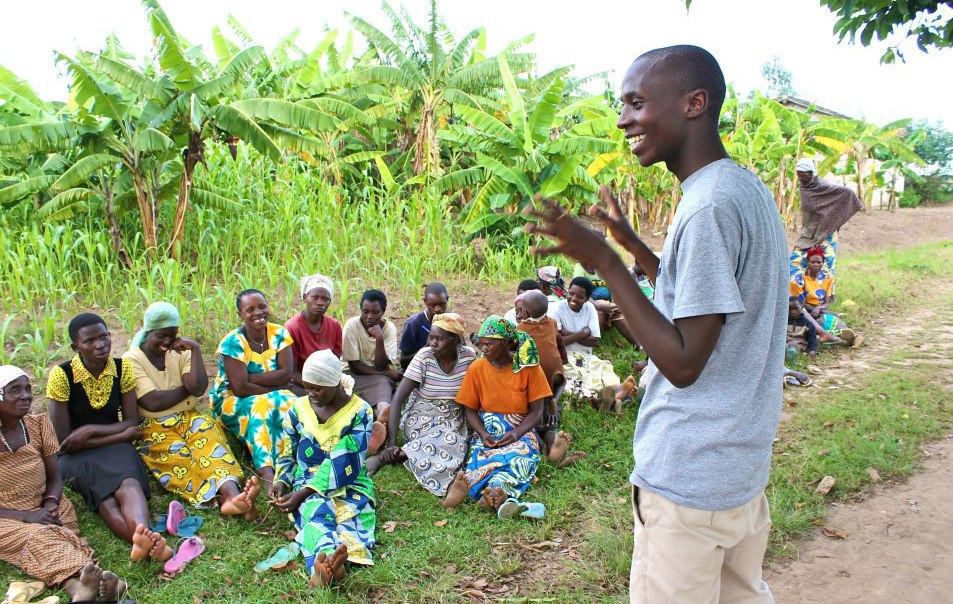
In discussing the work of a local NGO involved in social change, this article presents the role of development as an engine for unity, reconciliation and peace in post-Genocide Rwanda.
It’s been 22 years since the Tutsi Genocide in Rwanda, and there are still considerable challenges stemming from trauma and other poverty-related hardships. However, when traveling to different regions of this hilly country, you will see smiling faces, which makes it very difficult to imagine that the same individuals underwent a period of conflict and unthinkable pain. Those smiles reflect unity and reconciliation, which did not come by accident. They originate from the government’s efforts to unify its people, and from the involvement of development practitioners who have created an atmosphere of unity in the area. The country is now experiencing very fast economic growth compared to the rest of the region, as well as significant progress in the unity and reconciliation of Rwandans. According to the 2015 Rwanda Reconciliation Barometer (RRB), a national survey published by the National Unity and Reconciliation Commission (NURC), up to 92.5% of Rwandans feel that reconciliation has been achieved and that the citizens live in harmony.
Rwanda experienced a disastrous period in 1994 with a Genocide in which over a million people were slaughtered. The genocide took a heavy toll on Rwanda, both physically and psychologically, and temporarily destroyed its advancement. Keeping in mind the end goal to recapture and rebuild a new nation, post-Genocide Rwanda required the commitment of its institutions and people with the help of dedicated international workers to intercede and assist in the nation’s recovery and advancement. There are several types of interventions, by both governmental and non-governmental agencies, which focus on Rwanda's progress, while keeping in mind the issue of unity and reconciliation among its citizens.
As a Glocal Alumnus from Rwanda who had a chance to learn how development could create significant positive change across the globe, I find it essential to highlight the positive contributions development practitioners have made towards conflict resolution in my home country, and acknowledging the fact that they intentionally stood up and did whatever was in their capacity to help Rwanda regain hope and development, and reunite its people. Their success, in this case, underscores the fact that development practitioners have a major role in mitigating clashes. The literature discusses the role of development aid in conflict resolution. Developed by Mary B. Anderson in order to note the importance of not doing more harm than good while making sure to contribute to conflict resolution, “Do No Harm” is a concept embraced by most development aid practitioners.
Considering the large number of development practitioners working in Rwanda, international NGOs are playing a vital role in the reconstruction of the country. The most prominent agents in this cause work with communities utilizing community-centered and faith-based community development models. Jean Habumugisha, the former facilitator of Spark MicroGrants gladly answered when I asked, “The local government has been begging us to work with communities that still have social conflicts, since the model of our organization brings people to work together and allows them to lead their own development.” As a community-led organization, Spark MicroGrants has engaged and united different communities, among which are both survivors and perpetrators of genocide.
Jean Habumugisha assured us that these communities, based on Spark Microgrants’ work model, are more united now, without anyone being excluded. According to him, before a community starts working on a development project, the facilitators take participants through a community cohesion-building process which brings people closer together. The group then develops a goal, and commits to working towards the chosen goal as a community. "When different communities develop common goals, it is an indication of significant progress in terms of reconciliation among Rwandans".
In addition to Spark MicroGrants, an INGO called World Relief is also among the engines of reconciliation in Rwanda. This organization uses a faith-based development model and calls people to work together, as they are equally created in the image of God. Jean-Claude Muhire is a Glocal Alumnus from Rwanda who interned at World Relief Rwanda. He recognizes the contribution of this organization in helping Rwandans see each other as Rwandans, rather than through a divisive ethnic lens. “World Relief’s ‘Saving for Life’ program doesn’t exclude any Rwandan and it is charming to see everyone whole heartedly working together,” Jean-Claude said.
‘Saving For Life’ is part of the Village’s ‘Savings and Loans’ approach to development, and brings individuals together to save money and financially support each other with a little credit. This approach requires the community members to trust each other as the program grows with time, and everyone, regardless of their ethnicity, is welcome to join.
In sum, both World Relief International and Spark MicroGrants are examples of organizations helping Rwanda build a nation of Rwandans rather than a nation of ethnic groups. Thanks to their contributions, community members live together freely and confidently with more trust, as they strive together to build self-reliance. Setting goals and saving together has contributed to making everyone accountable for one another. Marginalized minorities regained hope- and the chance to work with others, and to take part in their own development.
Despite experiencing a high level of unity and reconciliation among its people, Rwanda still has a long way to go. Development practitioners have to keep working hard and to dig even deeper into more ways to contribute. There is a need to promote Rwandan identity beyond ethnic identity. However, there is also a need to help people remember their history by facilitating conversations about the past, and how the conflicts hindered social and financial development. Finally, development practitioners need to make sure to always consider community values, and help build a sense of community rather than focus solely on the project’s implementation. In the end, this will help unify community me
Ernest Ngabonzima


